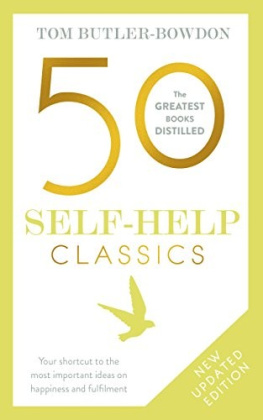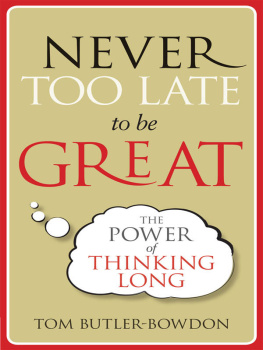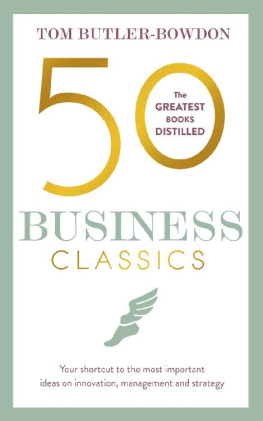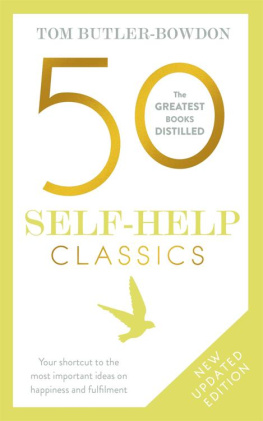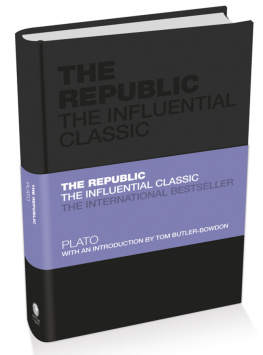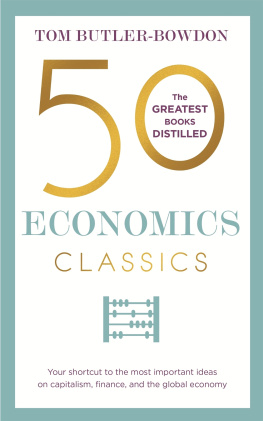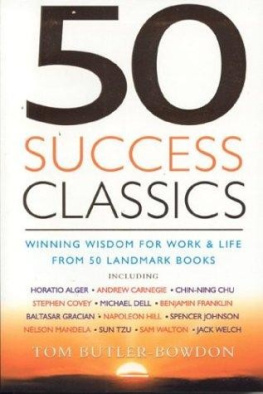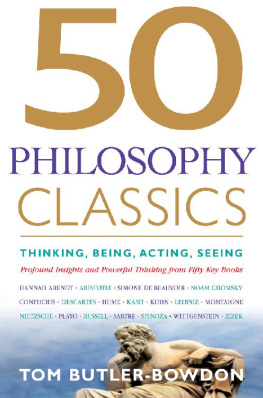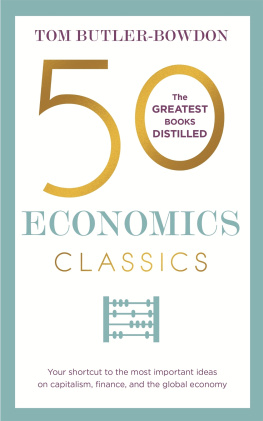Tom Butler-Bowdon [Butler-Bowdon - 50 Self-Help Classics: 50 Inspirational Books to Transform Your Life From Timeless Sages to Contemporary Gurus
Here you can read online Tom Butler-Bowdon [Butler-Bowdon - 50 Self-Help Classics: 50 Inspirational Books to Transform Your Life From Timeless Sages to Contemporary Gurus full text of the book (entire story) in english for free. Download pdf and epub, get meaning, cover and reviews about this ebook. year: 2010, publisher: Hachette UK, genre: Religion. Description of the work, (preface) as well as reviews are available. Best literature library LitArk.com created for fans of good reading and offers a wide selection of genres:
Romance novel
Science fiction
Adventure
Detective
Science
History
Home and family
Prose
Art
Politics
Computer
Non-fiction
Religion
Business
Children
Humor
Choose a favorite category and find really read worthwhile books. Enjoy immersion in the world of imagination, feel the emotions of the characters or learn something new for yourself, make an fascinating discovery.
- Book:50 Self-Help Classics: 50 Inspirational Books to Transform Your Life From Timeless Sages to Contemporary Gurus
- Author:
- Publisher:Hachette UK
- Genre:
- Year:2010
- Rating:3 / 5
- Favourites:Add to favourites
- Your mark:
50 Self-Help Classics: 50 Inspirational Books to Transform Your Life From Timeless Sages to Contemporary Gurus: summary, description and annotation
We offer to read an annotation, description, summary or preface (depends on what the author of the book "50 Self-Help Classics: 50 Inspirational Books to Transform Your Life From Timeless Sages to Contemporary Gurus" wrote himself). If you haven't found the necessary information about the book — write in the comments, we will try to find it.
Thousands of books have been written offering the secrets to personal fulfillment and happiness: how to walk The Road Less Traveled, Win Friends and Influence People, or Awaken the Giant Within. But which are the all-time classics? Which ones really can change your life?
Bringing you the essential ideas, insights and techniques from 50 legendary works from Lao-Tzu to Benjamin Franklin to Paulo Coelho, 50 Self-Help Classics is a unique guide to the great works of life transformation.
**
ReviewA tremendous resource for anyone seeking a bite-sized look at the philosophies of many self-help legends, including sacred scriptures of different traditions. Because the range and depth of the sources are so huge, the cumulative reading effect is amazing. Alternatively, it educates and edifies, affirms and inspires. Often both.
This is an exceptional and diverse collection for anyone interested in understanding the possibilities of the self.Ellen Langer, Professor of Psychology, Harvard University, author of Mindfulness
From the PublisherLife-transforming insights from timeless sages to contemporary gurus.
Experience, as never-before, the words and ideas of some of our deepest thinkers, spiritual teachers, and poets who represent the true inspiration for our new world:
James Allen Robert Bly Boethius Alain de Botton Dalai Lama * Ralph Waldo Emerson Benjamin Franklin Pierre Teilhard de Chardin * Henry David Thoreau
Explore the wisdom of ancient philosophy and religion:
Marcus Aurelius The Bhagavad-Gita The Bible The teachings of Buddha in The Dhammapada Lao-Tzus The Way of Power.
Learn from contemporary philosophers and inspirational gurus:
Martha Beck William Bridges David Burns Joseph Campbell and Bill Moyers Richard Carlson Dale Carnegie Deepak Chopra Paulo Coehlo * Stephen Covey
Mihaly Cziksentmihalyi Wayne Dyer Clarissa Pinkola Estes * Viktor Frankl Shakti Gawain Daniel Goleman John Gray Louise Hay * James Hillman Susan Jeffers Richard Koch Ellen Langer Maxwell Maltz Abraham Maslow Phil McGraw Thomas Moore Joseph Murphy Norman Vincent Peale Carol Pearson M Scott Peck Ayn Rand Anthony Robbins * Florence Scovell-Shinn Martin Seligman Samuel Smiles Marianne Williamson
Tom Butler-Bowdon [Butler-Bowdon: author's other books
Who wrote 50 Self-Help Classics: 50 Inspirational Books to Transform Your Life From Timeless Sages to Contemporary Gurus? Find out the surname, the name of the author of the book and a list of all author's works by series.

